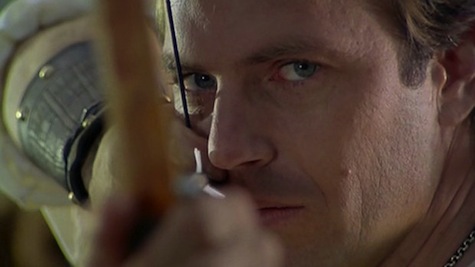Robin Hood: Prince of Thieves is a terrible movie. Much, much worse than you remember.
Most of the fault lies at Kevin Costner’s feet (and we’ll get to his lackluster performance in a moment), but the whole production is a splotchy mess. It’s nonsensical when it’s not racist, and that’s only when it’s not dull as dishwater—which, granted, is most of the time. All of the actors (with one shining exception) are utterly without charm. There are far too many subplots that don’t go anywhere. And everything is performed with an early 90s earnestness that ends up being super dour.
Just as The Adventures of Robin Hood set the Robin Hood story in a setting of race-based class divisions, Robin Hood: Prince of Thieves establishes bitter religious divisions and strongly held superstitions. Robin’s constant companion, Azeem the Moor, encounters religious and racial intolerance wherever he goes. The Sheriff of Nottingham executed Robin’s father on the charge of devil worship. The Sheriff’s soldiers refuse to enter Sherwood because they believe it’s haunted. Nominally, this is to set up Robin Hood as a symbol of Enlightenment, moving past superstition and towards a future where all people are treated as equals, regardless of race, sex, or religion.
But the film undercuts its progressive messaging with horrific moments of sexism, racism, anti-Semitism, and classism. Azeem is the only good Muslim we see. Robin’s Islamic captors at the beginning of the film are barbaric caricatures of human beings, cruel and ugly. The evil Sheriff actual is a devil worshipper and his witch can see the future, so maybe the soldiers’ superstitions are rational. And then, for no reason, the film makers decide to be racist against the Celts by depicting them as basically orcs with crows on their heads.
At least when the film is being offensive, something is happening. Most of the time, nothing at all happens. Robin spends a lot of time broodily walking through the countryside, or broodily training his “merry” men, or broodily taking care of his old blind servant, or just broodily brooding. The scenery is pretty, but boring. The music is pretty, but boring. (Or it’s a power ballad, and the less said about it, the better). I’m glad I invented a drinking game, because I could not have gotten through this film sober.
The plot’s pretty straightforward, as long as you ignore all the meaningless subplots. Robin returns from the Crusades to find the Sheriff has murdered his father and seized his lands; Robin takes them over a gang of thieves to lead them against the Sheriff, which gets a lot of the gang killed or captured; Robin then leads a jailbreak attempt to free them, rescues Marian from a forced marriage, and kills the Sheriff. If I tried to recount all the stupid, stupid subplots, we’ll be here all day.
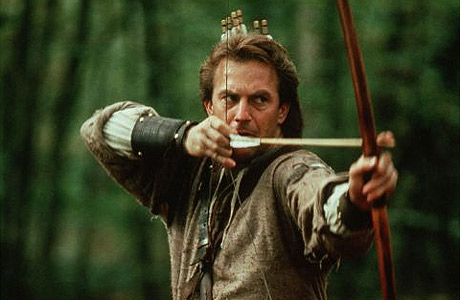
Robin Hood
Straight up, Costner is a terrible Robin Hood. It’s not that he can’t do an English accent (though he cannot). As we see in the Disney version, the characters don’t actually have to sound like they’re from 12th century England for us to accept that they are. But Costner’s delivery is flat across the board. It doesn’t matter if he’s bravely accepting punishment for his friend’s crime, or mourning his father, or charming Marian, or declaring revenge against the Sheriff; he says everything in the same flat, bored voice, like he’s reading his lines off cue cards for the first time and isn’t bothering with a second take. There are little moments of joy, like when he doesn’t understand how a telescope works, or when Azeem yells at him to “move faster,” but those moments are few and far between.
Not that Costner was given a lot to work with. This version of Robin is the worst, most self-centered version of any I’ve seen. Flynn’s Robin Hood was defined by his generosity. He turned outlaw in order to protect the poor of England, and keeps not a thing for himself. In comparison, Costner’s Robin Hood becomes an outlaw to get revenge and to get his lands back. Little John tells Robin his gold cross could feed the Merry Men for a month, and Robin clings to it more tightly. It’s easy to imagine Flynn (or Disney’s fox) carelessly tossing the cross to Little John, because what does he care about material good in the face of crushing poverty?
Costner’s Robin is also caught up in overbearing daddy issues. Brian Blessed(!) plays Daddy Loxley in an all too brief cameo as the perfect noble; kind, generous, surprisingly progressive in terms religious tolerance, class divisions, and opposition to the Crusades (Lord Grantham wishes he were so modern). Robin’s constant worry that he can’t live up to his father’s perfect example is joyless and smells of wankery.
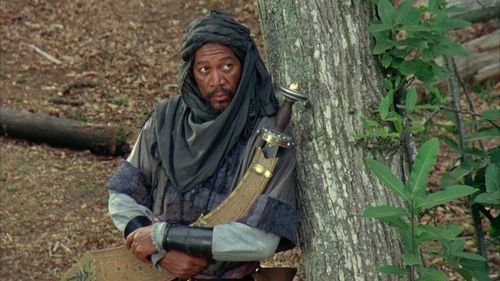
The Merry Men
Robin’s the worst, but the Merry Men aren’t much better.
Foremost among them is Azeem, played by Morgan Freeman, the Moor who followed Robin back to England like a lost puppy. And, again, while I appreciate the impulse to add some racial diversity to an otherwise lily-white story, Azeem is a magical negro, a brilliant man who possesses all of the knowledge of the Arab world (telescopes, gun powder, good birthing practices), but who subordinates his story to that of Robin’s in order to teach white people not to be racist. Worse, he basically enslaves himself to Robin because of that hoary cliché, the “life debt.”
But if Azeem is Robin’s right-hand man, then what’s a Little John or a Will Scarlett to do?
Little John becomes the original leader of the Merry Men, who Robin Hood supplants with basically one line of dialogue. He does little in the movie but worry. He worries about his wife. He worries about his son. And then about his wife giving birth to a new son. And even though he robs people on a river bridge, he apparently can’t swim (or tell he’s in only a foot of water).
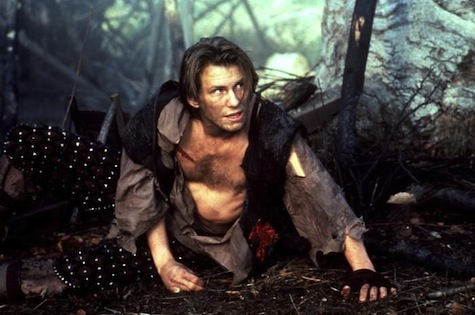
Will Scarlett… uh boy, Will Scarlett. Look, Costner is the main reason the film is terrible, but only because he’s in so much of it. On a per minute basis, Christian Slater’s Will Scarlett is so, so much worse. His acting is worse. His accent is worse. And his role is nothing but capital D Drama. He’s resentful of Robin’s noble upbringing, openly rebellious against Robin simply taking over the Merry Men, constantly complains, seems to betray the Merry Men to the Sheriff, then, in the worst twist in the film, turns out to be Robin’s half brother, the bastard his father sired with a common woman after Robin’s mother died. (Told you Daddy Loxley was progressive). So, no, Will doesn’t have a legitimate complaint, just the same daddy issues Robin has. And. I. Can’t. Care.
That leaves Friar Tuck, played by comedian Michael McShane. This Tuck is NOT the greatest swordsman in England. He’s just a drunk who holds some pretty violently anti-Muslim views, which of course melt away the moment Azeem successfully delivers Little John’s child. It’s not clear why the Merry Men invite him to stay, rather than just taking his ale and sending him humiliated on his way back to London. But he does get to push the evil greedy Bishop out a window and then perform Robin and Marian’s marriage in, as he says, “God’s only church,” so… I don’t know what I’m supposed to learn from this.
And then there’s Duncan, Robin’s old, blind servant. Duncan lives to suffer. First he’s beaten, blinded, and left for dead. Then he’s carted around Sherwood by Robin for a bit, before being beaten again, and then he dies, but not before leading the Sheriff to Robin’s secret hideout. Goodbye Duncan, you died as you lived, in misery.
There are about a dozen other Merry Men, but they are all miserable failures as thieves. Robin is the prince of some truly terrible thieves.
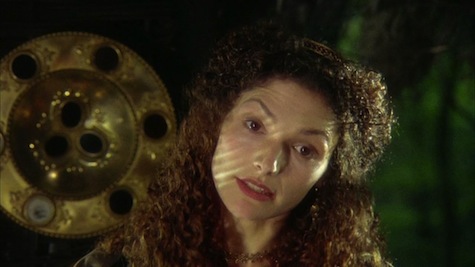
Marian
As with Azeem, there’s an attempt to make Maid Marian progressive that is completely undercut by what actually happens. She’s introduced as a knife wielding ninja, but Robin immediately defeats her. After that, she spends the rest of the movie as a damsel in distress, constantly under implied or immediate threat of rape. Her attempt to warn Robin about the Sheriff’s plot to take over the country gets her nurse arrested, Duncan killed, the Merry Men’s Ewok village burned, and herself press-ganged into marriage. She’s basically useless.
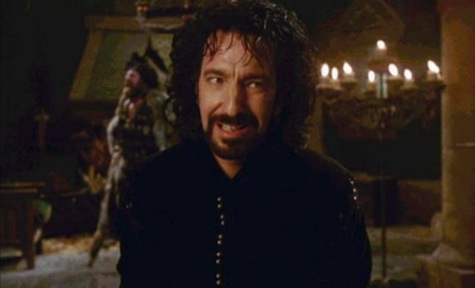
The Bad Guys
Okay, and now we come to the one bright spot in the entire movie, Alan Rickman, as the ridiculous Sheriff of Nottingham. Robin Hood: Prince of Thieves makes the… let’s say idiotic decision to eliminate Prince John completely and give his ambition of ruling England to the Sheriff. Never mind that this makes no sense (how does a lowly village sheriff have the authority, military might, and financial resources to support a coup?). Never mind that it’s unnecessary (the Sheriff could abuse the poor, steal Robin’s lands, and try to rape/marry Marian just because he wants to). And yet Alan Rickman fucking makes it work.
Of course, Rickman makes it work by playing the Sheriff for pure camp value. His Sheriff is a lascivious lout who Scrooge McDuck dives into a pile of gold coins, who keeps statues of himself and half-dressed women around his castle, who beats and kills his own men on a whim, who schedules sexual romps 15 minutes apart, who cancels Christmas, and who, in a set-up for the film’s most memorable line, threatens to cut out Robin’s heart with a spoon. Rickman’s Sheriff is an out and out supervillain, introduced in an ornate mask and white cloak. Rickman is a joy to watch.
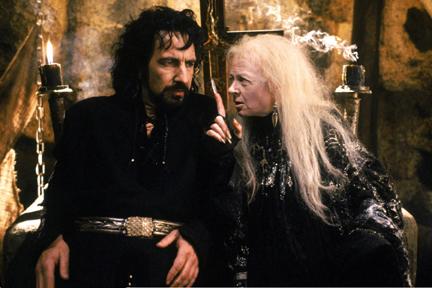
Rickman is also fighting the script with every line reading, because the Sheriff is written as poorly as any of the other characters, with his own nonsensical plots. He was raised by the witch Mortianna, who in the most overdramatic, unnecessary twist, turns out to be his birth mother. Why is there a witch in the Robin Hood story? So that Alan Rickman can stumble around an 80s music video conception of a dungeon, complete with a fog machine and green side lighting. She certainly doesn’t add anything.
There is a Sir Guy, played by professional bad guy Michael Wincott, but the film has room for only one sneering professional villain, so the Sheriff stabs him for no good reason. Ah well.
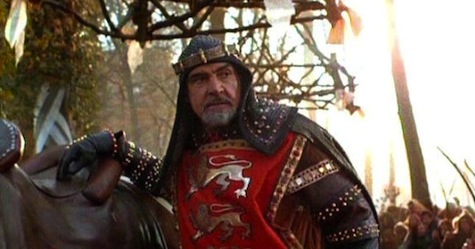
Richard and the Crusades
And again, a progressive sentiment (“hey, maybe religiously motivated wars are a bad thing,”) is undercut by the actual actions of the film. Yeah, paragon of good Daddy Loxley called the crusades “a foolish quest… vanity to force other men to our religion,” but that’s not what the title card at the beginning of the movie says. That card definitely implies that the worst part of the Crusades is how many young men it took out of England, never to return. And the Saracen prison guards are portrayed as inhuman monsters. And when Richard does ride up at the end (SEAN CONNERY!?), he’s treated as a hero, as if he had done nothing wrong to lead to this situation. So maybe Daddy Loxley was wrong about the Crusades?
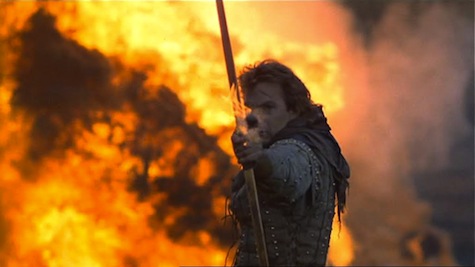
The Ending
For some reason, at the end Robin Hood: Prince of Thieves becomes really fun. Not so good to make up for the rest of the movie, because, just, no, but it’s like the rest of the cast discovered the over-the-top, campy, hilarious Robin Hood movie that Alan Rickman was making, and decided they should all be in that instead.
So in yet another storming of the castle to rescue someone from hanging (this time half the Merry Men, including Little John’s son), shit starts blowing up! Literally! (As in, literal shit, and literally blowing up.)
The climax includes such lunacy as:
- Little John develops super strength, knocking down the gallows with his bare hands!
- Robin fires flaming arrows two at a time!
- Morgan Freeman gives a rousing speech about how to be a free man!
- Azeem and Robin are catapulted over a wall and land in a convenient pile of hay!
- Will says a bad word!
- We learn the Sheriff’s first name is George! (What?)
- A scribe who had his tongue cut out talks! (Whoops!)
- The Sheriff tries to rape Marian while the Bishop is still performing the marriage rites!
- Robin crashes through a stain-glass window (like a proper Robin Hood)!
- The witch teleports to one side of locked door, only for Azeem to run her through with a pike!
- Robin and the Sheriff have a decent sword fight.
- The witch teleports to the other side of the locked door, only to have Azeem kill her again by throwing a sword so hard she flies across the room!
If the whole movie had been set at this fever pitch, with over the top action and violence and character choices… well, I’m not saying it would have been good, but it would have been a lot more fun and memorable and exciting.
But the ending isn’t enough to wash away the boring, racist taste of the rest of the film, and when Friar Tuck looks directly into the camera to tell Robin and Marian (and us) to get out of here and start making babies, and that… that… that song starts playing, I’m reminded why I goddamn hate this movie.
You know, somebody could make a really good parody….
Drinking Game
Three drinks, but you’ll want it to be more. There’s no real archery contest, but Robin does split an arrow in the training montage, because I guess that’s a thing you need to do in a Robin Hood movie.
The killer trigger in this film is racism. There’s a lot, both the characters being racist (the English towards Azeem, Azeem towards the English), and the film being racist (Celts are giants that feel no pain and rape women in the middle of battlefields).
Yuck.
Steven Padnick is a freelance writer and editor. By day. You can find more of his writing and funny pictures at padnick.tumblr.com.










